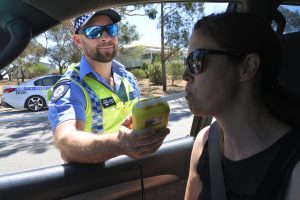 The Ontario Provincial Police (OPP) recently implemented a policy of administering a breath alcohol test to every driver stopped for a traffic offense. Even if the stop is for a minor violation, and even if the officer has no suspicion the driver is under the influence, the driver must submit to a breath test. Refusing the test is a criminal offense. Could this happen in Ohio?
The Ontario Provincial Police (OPP) recently implemented a policy of administering a breath alcohol test to every driver stopped for a traffic offense. Even if the stop is for a minor violation, and even if the officer has no suspicion the driver is under the influence, the driver must submit to a breath test. Refusing the test is a criminal offense. Could this happen in Ohio?
It’s Not Just Ontario
The Ontario policy is based on a Canadian federal law. The law, which became effective in June of 2018, authorizes law enforcement officers to demand that a driver provide a roadside breath sample on an alcohol screening device, whether or not the officer suspects the driver recently consumed alcohol. Canada is one of about 40 countries which have such a law. The mandatory alcohol screening is apparently consistent with the Charter of Rights and Freedoms, Canada’s version of the Bill of Rights.
The U.S. and Ohio Constitutions Provide More Protection
The Fourth Amendment to the United States Constitution protects people from unreasonable searches and seizures. Article I, Section 10 of the Ohio Constitution provides the same protections. Accordingly, a search must be conducted pursuant to a search warrant or a recognized exception to the search warrant requirement.
A breath alcohol test is a search. An officer making a traffic stop never has a search warrant for a breath alcohol test. Therefore, the officer cannot administer a breath alcohol test unless the circumstances create an exception to the search warrant requirement.
One of the recognized exceptions to the search warrant requirement is a search ‘incident to arrest’. If a law enforcement officer makes a lawful arrest of a person, the officer is permitted to search the person and the area within the person’s immediate control. In the case of Birchfield v. North Dakota, the United States Supreme Court held the Fourth Amendment permits breath alcohol tests which are incident to a lawful arrest for driving under the influence.
How Search and Seizure Law Impacts Ohio OVI Cases
Most DUI cases (called ‘OVI’ in Ohio) begin with a traffic stop, which is a seizure of the person. A warrantless traffic stop is permitted if the officer reasonably suspects the driver is under the influence or has probable cause to believe the driver committed a violation of the law.
While interacting with the driver, the officer may decide to further detain the driver for an OVI investigation, which usually includes field sobriety tests. That further detention must be supported by a reasonable suspicion the driver is under the influence of alcohol and/or drugs.
The officer may then decide to arrest the driver, and the arrest is only justified if the officer has probable cause to believe the driver operated a vehicle under the influence. If the arrest is justified, the officer may then ask the driver to take a breath alcohol test.
You Down With OPP?
Due to federal and state search and seizure law, Ohio could not implement a law like the Canadian Mandatory Alcohol Screening law now being implemented by the Ontario Provincial Police (OPP). I’m not down with OPP. Subjecting every driver to breath alcohol testing during traffic stops results in unreasonable searches. I’m glad I drive primarily in Ohio, where we are protected by the constitutions of Ohio and the United States.
 Columbus OVI/DUI Attorney Blog
Columbus OVI/DUI Attorney Blog

